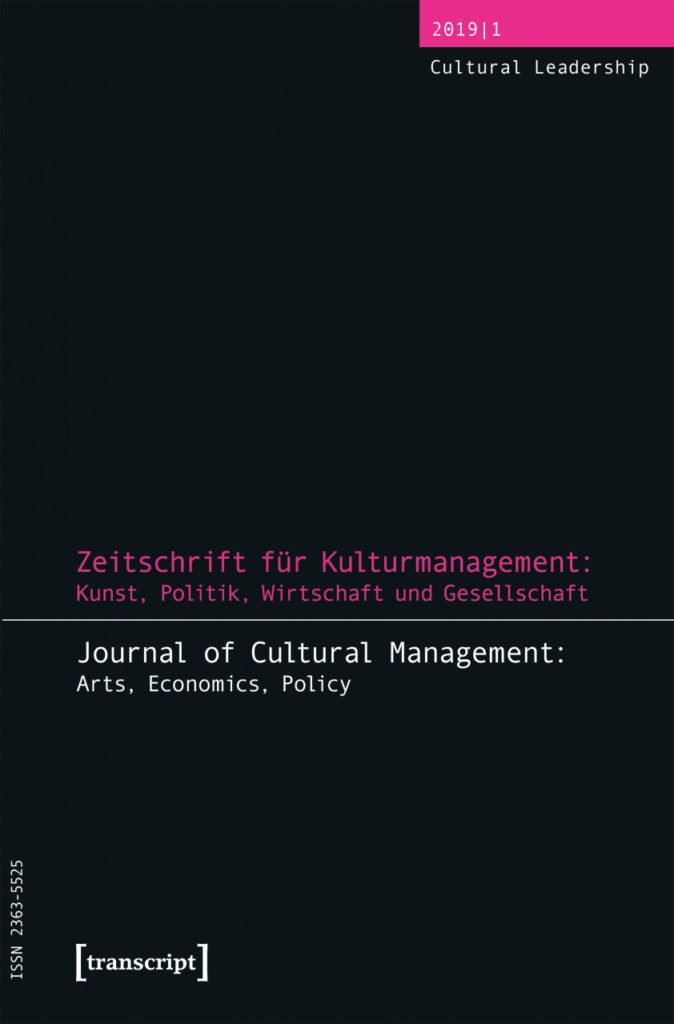Research Article
Imposed leadership in UK funded theatre and the implications for risk and innovation
Abstract
Using the theory of stakeholder salience and stakeholder discourse, this article questions the effect of arts policy bodies on the way the cultural sector assigns leadership. It argues that in satisfying the demands of risk-averse public management, arts policy bodies implicitly and explicitly impose the role of sectoral leader on the heads of largest best-funded cultural organisations. As a result, opportunities for alternate forms of leadership to emerge outside organisations are restricted. It renders organisational leaders in conflicting obligations to multiple stakeholders – their funders, their organisations and their sector – and exposes implicit perceptions of value. Finally, in reinforcing existing organisational structures, imposed leadership inhibits the risk- taking and innovation these same arts policy bodies promote in their strategies. This prevents the emergence of more transgressive forms of leadership and innovative cultural production and affects the ability of artists to be perceived as leaders. Consequently, artists’ sectoral and policy influence is diminished and their precarity and inequality reinforced at a structural level. While focused on subsidised theatre in the UK, this research offers wider implications for how we understand policy influence on ethical leadership behaviours in the cultural sector.
Keywords
2019 (1)
Cultural Leadership

Related Articles
Kulturpolitik - Ein Praxisfeld ohne Theorie?
Yearbook for Culture Management 2011
Research Article
Die Figur des Dritten, die Taktik des Zuschauers und der Kulturbetrieb
Yearbook for Culture Management 2012
Research Article
Participation in Cultural Policies: Ideological Roots and Institutional Use
Journal of Cultural Management and Cultural Policy
Research Article
Journal of Cultural Management 2016 (1)
Case Study
Yearbook for Culture Management 2010
Essay
Kulturpolitik und Kulturmanagement
Überlegungen zu einer PolitikfeldanalyseYearbook for Culture Management 2010
Research Article
© 2026, Journal of Cultural Management and Cultural Policy
Keywords
- Aesthetics
- Higher Education
- Cultural Diplomacy and Foreign Cultural Policy
- Occupation
- Career and Professional Role
- Audience Development
- Audience Studies and Visitor Studies
- Visitor Motivations
- Business
- Covid Pandemic
- Democracy
- Digitalization
- Diversity
- Third Sector
- Empirical Aesthetics
- Development
- Ethics
- Evaluation
- Field Theory
- Festival
- Film
- Federalism
- Community Arts
- Societal Change
- Ideology
- Staging
- Career
- Communication
- Concert
- Creative Industries
- Creativity
- Crisis
- Culture
- arts organizations, cultural organizations
- Cultural Participation
- Cultural Change
- Fincancing The Arts
- Cultural Promotion Law
- Cultural History
- Cultural Management
- Cultural Economy
- Cultural Organizations
- Art Education
- Cultural Policy
- Cultural Production
- Cultural Sociology
- Art Education
- Cultural Understanding
- Arts Administration
- Cultural Industry
- Cultural Sciences
- Art
- Art Field
- Arts Research
- Artists
- Artistic Research
- Artistic Reputation
- Arts Management
- Arts Organizations
- Art education
- Arts Marketing
- Arts Administration
- Curating
- Leadership
- Literature
- Advocacy
- Management
- Marketing
- Market
- Media
- Methods Development
- Mexico
- Monumentalizing
- Museum
- Music
- Non-Visitor Studies
- Opera
- Orchestra
- Organization
- Political Expression
- Post-truth Politics
- Professional Role
- Audience
- Audience Development
- Law
- Government
- Role
- Socially Engaged Art
- Social Cohesion
- Social Change
- Social Cohesion
- Non-visitor Socio-demographics
- Socioculture
- State
- Symbolic capital
- Dance
- Participatory Justice
- Theatre
- Theatre Governance
- Theory Development
- Tourism
- Transformation
- Survey
- Entrepreneurship
- Urbanism
- Civil Society


